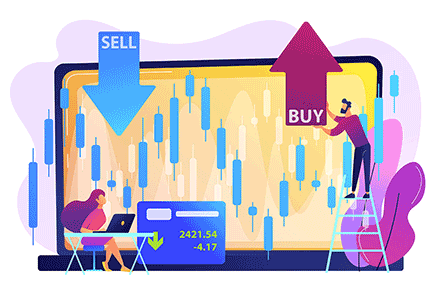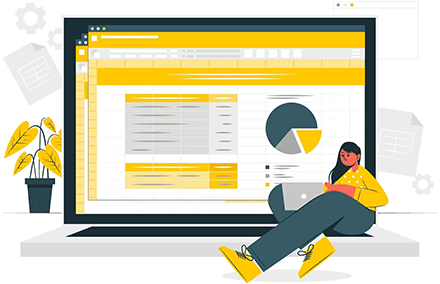Especially beneficial for those just dipping their toes in the trading waters, it not only eases their entry but also offers a rich learning curve. Yet, even for the seasoned veterans, it's a way to take a breather without missing out on potential market moves. Our Robust Trading Solution Introducing our top-tier copy trading application. With this, you can effortlessly mirror trades of seasoned professionals after meticulously examining their track record and stats. The technology behind it offers both manual and automated settings, giving you the flexibility and comfort to either actively monitor or simply observe from your browser or mobile, akin to the functionalities of the AvaSocial trading app.
Why Choose Copy Trading?
- A Guided Start: Beginners can acquaint themselves with market dynamics while building the confidence to venture independently.
- Learn by Observing: Witnessing seasoned traders' strategies provides invaluable insights into the trading world.
- Flexibility in Participation: Even during your busiest days, the market won’t move without you, thanks to the automation of copy trading.
- Diverse Portfolio: From commodities to currencies, indices to stocks, there’s a vast range of instruments at your disposal.
- Community Engagement: Engage, interact, and grow with a dynamic community of traders. Share strategies, discuss market trends, and elevate your trading game collectively.
Copy Trading: A Global Phenomenon
The recent surge in popularity of copy or mirror trading isn't without reason. Success stories from early adopters have painted a promising picture, prompting more and more traders to jump on board. The allure of leveraging other investors' prowess and skills has created a wave, benefiting both newcomers and pros. It’s a gateway to acquaint oneself with new market strategies, and for the experienced, it can mean adding another layer of proficiency.
For those tentative about entering the stock market due to limited experience or those seasoned traders looking for a fresh perspective, mirror trading can serve as an enlightening starting point.
Unpacking the Growth of Copy Trading
There are traders who delve deep – attending seminars, paying for expert advice, and investing time in strategies. And then there are those who aim for substantial gains with minimal involvement. For the latter, copy trading has emerged as the perfect tool. Over the past half-decade, its growth trajectory has been remarkable, primarily because traders find solace in the community-centric approach. With platforms like AvaTrade offering access to renowned signal providers via the AvaSocial app, there's a burgeoning trust in the system. Importantly, it's not just for the novices. Many experts leverage copy trading for efficient market research, strategizing, and exploring potential profit avenues.
Distinguishing Social Trading from Copy Trading
While copy trading falls under the umbrella of social trading, they are distinct in their operation. Copy trading is essentially about mirroring another trader's actions – profits and losses alike. It’s a more passive approach where decisions rest with the trader being copied. However, there are platforms allowing semi-automation, letting you decide which trades to mirror.
Social trading, meanwhile, integrates the essence of social media. It emphasizes community interaction, enabling traders to share insights, discuss strategies, and keep tabs on others' trading behaviors. Apps like AvaSocial offer an array of features – from chatrooms to comprehensive trader statistics. It’s about collective growth and mutual learning.
Whether you lean towards pure copy trading or a more interactive social trading, it’s crucial to align with a strategy fitting your trading aspirations. AvaTrade, with its diverse offerings, ensures every trader finds their match.
Deciphering Trading Signals
On the AvaSocial copy trading app, traders have the liberty to delve deep into the metrics – studying statistics, evaluating portfolios, and comprehending the caliber of traders. By harnessing this strategy, numerous traders, both rookies, and veterans have unlocked new success dimensions in trading.
Embarking on a Successful Copy Trading Journey
- Broker Selection: Collaborate with a regulated broker like AvaTrade, ensuring security, a broad asset spectrum, and exceptional client support.
- Account Set-up: Activate your account via your browser or mobile device. Platforms like AvaSocial or other prominent copy trading solutions at AvaTrade are at your disposal.
- Choose Your Signal Provider: An active account showcases a roster of signal providers complete with their stats, from Profit & Loss metrics to risk profiles. Align with those resonating with your objectives.
Dive into the world of trading with an informed approach. Whether you're practicing with a Demo account or are set to hit the ground running with a Real account, the world of trading awaits you with immense possibilities.
In the ever-evolving world of Forex trading, traders constantly seek innovative strategies and tools to maximize profits and mitigate risks. Among the myriad of options available, copy trading has emerged as a prominent and popular approach, especially among those new to the Forex market. This article delves into the concept of copy trading, exploring its nuances and determining its role in the broader Forex trading landscape.
What is Copy Trading?
Copy trading, often referred to as mirror trading, is a strategy where individual traders replicate the trades of experienced and successful Forex traders in real-time. By doing so, they can mirror the performance of these experienced traders in their own accounts, essentially leveraging the expertise of seasoned professionals.
How Does Copy Trading Work?
- Platform Selection: Traders begin by choosing a trading platform that offers copy trading services. These platforms often list experienced traders, showcasing their trading histories, strategies, risk levels, and performance metrics.
- Choosing a Trader to Copy: After analyzing the available data, traders can select an experienced trader whose strategy aligns with their own financial goals and risk tolerance.
- Automated Replication: Once a trader is selected, the platform automatically replicates their trades in the copier's account. The amount invested in each trade is proportionate to the copier's account balance.
- Profits and Losses: Profits and losses in the copier's account mirror those of the copied trader. If the copied trader profits, so does the copier, and vice versa.
Advantages of Copy Trading:
- Simplified Trading for Novices: Copy trading is particularly beneficial for beginners who might find the Forex market complex. It allows them to learn from real-time trades without the immediate need to understand intricate market dynamics.
- Diversification: By copying multiple traders, individuals can diversify their portfolio, spreading risks across different trading strategies.
- Time-Efficient: With trades being automatically mirrored, copiers don't have to spend time analyzing the market or making trading decisions.
- Transparency: Most copy trading platforms offer detailed performance metrics, ensuring copiers have a clear understanding of their chosen trader's strategies and results.
Limitations of Copy Trading:
- Dependence on Others: Reliance on another trader's strategy might inhibit the development of one's own trading skills and insights.
- Past Performance Isn’t Indicative of Future Results: Even experienced traders can incur losses. Success in the past does not guarantee future profits.
- Lack of Control: Since trades are automatically mirrored, copiers might sometimes feel a lack of control over their trading activities.
- Cost Implications: Some platforms might charge additional fees for copy trading services or require a portion of the profits.
Is Copy Trading Suitable for Everyone?
While copy trading offers numerous advantages, especially for those new to Forex, it's essential to assess individual goals, risk tolerance, and investment horizon. Those seeking to understand the intricacies of the Forex market and develop a personal trading style might find other strategies more beneficial.
However, for individuals who prefer a more hands-off approach, wish to diversify their trading strategies, or simply want to leverage the expertise of seasoned traders, copy trading can be an attractive option.
Copy trading in Forex presents an intriguing amalgamation of technology and trading expertise, allowing individuals to benefit from the knowledge of experienced traders. As with all trading strategies, it's essential to conduct thorough research, understand the associated risks, and choose a reputable trading platform. With careful consideration and prudent decision-making, copy trading can serve as a valuable tool in a trader's arsenal.
Copy Trading: An In-Depth Look
Copy trading has evolved from a mere novelty in the mid-to-late 2000s into a respected trading mechanism embraced by both new and seasoned traders. Predominantly prevalent in the vast and liquid Forex market, this method has branched into stocks and cryptocurrencies, promising potential profitability without the need for intensive market study. Let's delve into the intricacies of copy trading.
At its core, copy trading is an offshoot of social trading. It involves mirroring the trades executed by another, often more experienced, trader. Think of it as investing in a trader's acumen rather than an asset directly. The expert trader, often referred to as the master or signal provider, benefits either through a set fee or a portion of the profit garnered from their followers.
In its early days, this form of trading was manually executed. Followers would wait for signals and then initiate corresponding trades. Modern copy trading, however, is predominantly automated. Followers can mimic every move made by the expert trader, from opening to closing positions.
For novices, this method requires little to no market knowledge. It's like being in the passenger seat, allowing an experienced driver to navigate the complex financial roads. However, the educational aspect of copy trading is limited, as understanding the rationale behind each trade is often not part of the package. Even adept traders can reap the benefits. Copy trading allows diversification, an influx of new trading ideas, and the potential for passive income with minimal effort.
Tracing the Origins
The embryonic stages of copy trading can be attributed to the 90s, when traders would disseminate newsletters, articulating their strategies and decisions. With the rise of the internet, virtual rooms and chats became the modern arenas of trade discussion. This was the precursor to today's sophisticated copy trading systems.
Automated trading platforms, like Tradency's Mirror Trader launched in 2005, revolutionized the landscape. These platforms enabled traders to display their strategies and let others mirror the transactions stemming from these strategies.
As the 2010s rolled around, copy trading's popularity soared, with many Forex brokers jumping on the bandwagon. However, the repercussions of the 2008 financial crisis coupled with a surge in scam platforms led to stringent regulations, streamlining and enhancing the reliability of remaining copy trading services.
Dissecting the Variants
Copy trading, mirror trading, and social trading are terms that are often used interchangeably, yet they harbor distinct nuances:
- Social Trading: A platform for traders to share insights and strategies. It requires individual decision-making based on shared knowledge, making it more effort-intensive.
- Mirror Trading: As the name suggests, traders mimic strategies, either manually or using automated tools, without necessarily following a specific trader.
- Copy Trading: A direct replication of another trader's actions. It's predominantly passive, with modern platforms allowing complete automation after initial setup.
Delving into Copy Trading Approaches
There are three primary methods:
- Automated: Select a trader, define risk parameters, and let the platform handle the rest.
- Manual: Act based on another trader's moves, but execute trades manually. This method offers more control but demands a prompt response.
- Coaching: A blend of manual copy trading with educational insights explaining the rationale behind each move. Ideal for beginners, though typically pricier.
Regulatory Overview
Legal and regulatory frameworks for copy trading vary worldwide. While the activity is legal in most jurisdictions, the specifics can differ. For instance, in the European context, the European Securities and Market Authority (ESMA) has provided directives under the MiFID for both copy and mirror trading. Similarly, in the U.S., the Dodd-Frank Act imposes regulations relevant for copy traders.
It's crucial to understand local regulations and ensure compliance, especially if your trading crosses international boundaries.
Always opt for platforms and traders that adhere to recognized regulatory standards. Copy trading offers an enticing avenue for traders to potentially profit from the market without being deeply involved in its intricacies. However, as with all investment avenues, it's crucial to undertake thorough research, understand the associated risks, and proceed with caution.
Copy Trading: Weighing the Pros and Cons
Copy trading, a rapidly growing phenomenon in the world of finance, offers a bridge between the worlds of the amateur and the professional trader. It's a mechanism allowing individuals to automatically copy the trades of seasoned market players. As with any investment method, copy trading presents its blend of benefits and challenges. Understanding both can help potential traders decide whether it's the right approach for them.
Advantages of Copy Trading
- Democratizing Finance: Copy trading democratically opens the doors of financial markets. Even those with zero trading experience can step into the realm with relative ease.
- Leveraging Expertise: Relying on seasoned traders means you're piggybacking on their market knowledge and strategic acumen, giving you a potential edge.
- Educational Opportunity: Observing professionals can provide insights into market dynamics and strategies, making it an implicit learning experience.
- Diversification: Engaging with diverse traders ensures you spread your investment across a broad spectrum, which can stabilize and reduce portfolio risk.
- Efficient Time Management: Automation means even those juggling full-time jobs can remain active in the market without the constant monitoring typically required in trading.
- Emotionless Trading: Removing emotional decision-making can often lead to more consistent and rational investment choices.
- Monetizing Expertise: Skilled traders have the dual opportunity of not only profiting from their trades but also earning additional revenue by sharing their trades.
Challenges and Risks of Copy Trading
- Surrendering Control: Copy trading may sometimes feel like placing your trust (and money) on autopilot, potentially leaving you at the mercy of another's decisions.
- Diminished Learning: Passive observation might provide limited learning. Without actively engaging, understanding the nuances of market decision-making can be elusive.
- Unpredictable Market Dynamics: The market's inherent volatility means even the most successful traders can have off days. It's vital to remember that past wins aren't a guarantee of future success.
- Liquidity Concerns: Delays or mismatches in trade executions, especially in niche markets, can affect profitability and strategy adherence.
- The Black Swan Events: Rare, unpredictable events can significantly impact the market. It's always wise to be prepared for unexpected jolts, as they can affect even the most seasoned traders.
- Cost Implications: While you might be paying for the privilege of leveraging another trader's expertise, costs like spreads, commissions, and service fees can chip away at profits.
The Smart Approach to Copy Trading
Copy trading can serve as a dynamic introduction to the trading world, especially for novices. It provides a front-row seat to professional decision-making, strategy formulation, and risk management. Experienced traders can also find value in diversifying their strategies or generating additional income. However, like all investment methods, it's essential to approach copy trading with eyes wide open. Blindly copying without understanding can lead to unanticipated outcomes. If you're genuinely passionate about trading, consider using copy trading as a stepping stone, a launchpad for deeper market immersion. After acquiring foundational knowledge and initial capital, you might find that combining your trades with the expertise of others is the winning formula for your investment journey.
How to Choose a Forex Broker for Copy Trading
Copy trading has gained considerable popularity in the forex market. By enabling traders to replicate the strategies of seasoned professionals, copy trading democratizes access to the markets, especially for newcomers. However, selecting the right broker for this endeavor is crucial. Here's a guide on how to make an informed decision:
- Understand Copy Trading: Before diving in, make sure you understand what copy trading entails. In essence, you're allocating a portion of your capital to automatically mimic the trades of a chosen professional trader. Your success is tied to theirs.
- Regulation and Security: Ensure the broker is regulated by a recognized financial authority. Regulatory compliance guarantees that the broker adheres to strict standards that protect traders. It also ensures that your funds are segregated from the broker’s operational funds and are safe in the event of bankruptcy.
- Transparency: A good copy trading platform should provide clear insights into the strategy, historical performance, risk metrics, and other relevant data of each professional trader. This transparency enables you to make an informed decision on whom to follow.
- Cost Structure: Brokers can charge fees for copy trading services. These could be in the form of spread mark-ups, subscription fees, or profit-sharing. Make sure you understand the cost structure, as this will impact your overall returns.
- Flexibility and Control: Determine how much control you'll have over the copy trading process. Can you start or stop copying a trader at any time? Can you manage risk by setting a stop loss or take profit levels? Being able to customize your copy trading experience is vital.
- Diversity of Trader Profiles: A diverse selection of traders increases the chances of finding someone whose strategy aligns with your investment goals. Whether you're risk-averse or open to higher volatility, there should be a trader profile that suits you.
- Platform Usability: The broker's platform should be intuitive and user-friendly. Whether it's viewing trader profiles, analyzing performance, or monitoring your own portfolio, ease of navigation can enhance your trading experience.
- Customer Support: In the world of forex, issues can arise at any hour. Opt for brokers with responsive customer support, preferably 24/7, and multiple channels like chat, phone, and email.
- Reputation and Reviews: Consider the reputation of the broker in the trading community. Online reviews, forums, and community feedback can provide insights into the experiences of other copy traders with the broker.
- Additional Features: Some brokers may offer complementary tools like educational resources, market analysis, and news feeds. While not directly tied to copy trading, these resources can be beneficial for your overall trading journey.
Copy trading can be a viable strategy for those looking to tap into the forex market without extensive knowledge or experience. However, the choice of broker plays a pivotal role in this journey. Take the time to research, compare, and test (perhaps via a demo account) before committing your capital. In the dynamic world of forex, a well-informed decision can be the difference between success and setbacks.
Top 10 Copy Trading Brokers in 2023
NordFX provides a variety of trading strategies to choose from
NordFX has been in the financial market since 2008 and offers its 'CopyTrading' service, which allows investors to select and replicate the trades of experienced traders. The platform provides a variety of trading strategies to choose from, enabling both beginners and experienced traders to benefit.
- Flexibility to choose and switch between strategies.
- Access to detailed performance metrics for each strategy.
- Low minimum deposit to start copy trading.
HF Markets provides the "HF Copy" feature and allows strategy providers to share their expertise
HF Markets, often recognized as HotForex, presents the "HF Copy" service. With it, users can easily copy trades from strategy providers, making it a favorable choice for traders looking for passive investment options. The broker is well-regarded for offering detailed analytics of strategy providers, facilitating informed decision-making.
- Risk management options such as setting maximum drawdown limits.
- Provides performance analytics for copied strategies.
- Suitable for both novice and expert traders to generate extra income.
OctaFX offers a Copy Trading platform. Provides detailed trader profiles to copy
OctaFX has cemented its place in the forex market with its "Copytrading" service. The platform showcases detailed profiles of trader performances, making it easier for users to decide whom to follow. The risk score feature also allows investors to understand the risk level of each trader.
- Simplified user interface for easy copying.
- Transparent performance metrics.
- Offers risk score for each trader to copy.
FXCM Offers third-party platforms like ZuluTrade for copy trading. Provides access to multiple signal providers.
FXCM offers copy trading primarily through third-party platforms like ZuluTrade. By integrating these platforms, FXCM broadens the spectrum of signal providers available to its clients, ensuring they have a variety of strategies to choose from.
- Integration with established third-party platforms.
- Wide range of trading strategies to choose from.
- Flexibility in adjusting account settings according to risk tolerance.
easyMarkets offers tools like easyTrade but does not have a proprietary copy trading platform
While easyMarkets doesn't have a native copy trading service, it collaborates with external platforms to offer such capabilities. Combined with its innovative trading tools like 'easyTrade', easyMarkets provides a comprehensive trading experience.
- Access to a wide network of traders through partner platforms.
- Allows users to leverage innovative tools along with copy trading.
eToro pioneers in the CopyTrader system. Allows users to automatically copy the trades of successful traders
eToro is synonymous with social and copy trading. With its intuitive 'CopyTrader' system, eToro pioneered the concept of social trading. The platform allows users to replicate the trades of professionals seamlessly, and its vast community offers a dynamic environment for discussions and insights.
- Highly transparent performance and risk metrics.
- A large community of traders to choose from.
- Social trading features, including discussions and insights.
Forex4you offers the Share4you copy trading service. Provides detailed analytics for signal providers
Forex4you brings "Share4you", a service that lets users automatically copy the trades of more experienced traders. The platform's strength lies in its user-friendly interface and the customization of copying ratios, catering to the different risk appetites of traders.
- Allows customization of copying ratios.
- User-friendly interface.
- Performance-based commission system.
Swissquote Bank does not have a proprietary copy trading system but provides tools for advanced trading. Offers Robo-Advisory services.
Swissquote, with its banking background, offers a range of advanced trading tools. While it doesn't have a dedicated copy trading system, it does offer Robo-Advisory services. Traders benefit from the bank's strong financial standing and the advanced analytical tools it offers.
- Access to sophisticated trading tools and analysis.
- High standard of banking and financial security.
Moneta Markets WebTrader platform with innovative tools. Focus on social trading but specifics about copy trading may vary
Moneta Markets, with its WebTrader platform, emphasizes on social trading. While specifics about its copy trading features can vary, the platform offers an array of tools seamlessly integrated into its system, ensuring traders have everything they need at their fingertips.
- User-friendly interface suitable for both beginners and professionals.
- Seamless integration of tools with trading platforms.
XM collaborates with third-party platforms like ZuluTrade for copy trading.
XM partners with third-party platforms like ZuluTrade to offer copy trading services. This collaboration ensures users have access to a wide array of professional traders. Additionally, XM stands out with its emphasis on educational content, which greatly complements its copy trading services.
- Access to an extensive range of professional traders via third-party platforms.
- Provides high-quality educational content that complements copy trading.
To conclude, while many of these brokers provide specialized copy trading services, it's paramount for traders to review the current offerings and terms directly on the broker's official website to ensure they're up-to-date with the latest features and regulations.
Demystifying Copy Trading: Your Top Questions Answered
- Do I Need Experience to Dive into Copy Trading? If your sole intention is to shadow and replicate the trades of seasoned traders, then you don't necessarily need any prior experience. However, a foundational understanding of trading can be advantageous when it comes to discerning which traders are worth copying. Interestingly, many novices are drawn to copy trading as a launchpad into the trading universe. It not only provides a stepping stone to amplify their account but also, if approached with an analytical mindset, offers invaluable lessons about trading dynamics. For those apprehensive about potential losses, starting with a demo account can be a prudent approach, offering a risk-free environment to understand the nuances before transitioning to a funded account.
- Is There a High Risk Associated with Copy Trading? Risk is a constant companion in the world of trading, and copy trading is no exception. By meticulously vetting traders on platforms like the AvaSocial trading app, the risk you undertake is comparative to managing your own trades. However, it's imperative to grasp that a trader's historical success doesn't guarantee future triumphs. For instance, a trader with a stellar three-year track record might face setbacks shortly after you commence copying them. As a golden rule in trading, only invest an amount you're comfortable potentially losing.
- How Do I Identify Reliable Traders for Copying? While staggering figures like a 300% annual return might be enticing, it's often prudent to approach such numbers with caution. High returns might be indicative of disproportionate risks, which can lead to significant losses in the long run. Instead, focus on traders with a stable trading history spanning at least a year and demonstrating consistent, realistic returns. Their trading activity should also be frequent, indicating an active engagement in market dynamics rather than stagnation with solitary trades. A diversified approach can further mitigate risks. By allocating your investments across multiple traders—perhaps 2-4 as many adept users of the AvaSocial trading app do - you can spread potential risks and optimize chances of overall portfolio growth.
Related Materials
Forex trading, an intricate dance of buying and selling currency pairs such as EUR/USD, GBP/USD, and USD/JPY, operates continuously five days a week. Often called foreign exchange trading, the core objective is to profit from shifts in currency pair values.
The forex market has witnessed a rise in the popularity of Percentage Allocation Management Module (PAMM) services, as both retail traders and institutional investors seek out ways to diversify their portfolios and earn passive income. As 2023 unfolds, it's pivotal to identify which brokers are at the forefront of offering top-notch PAMM services..
If the concept of hedging in the world of Forex has left you intrigued, search no further. This comprehensive article will unravel the intricacies of Forex hedging, furnish you with a practical example of a Forex hedging strategy, and delve into the "Hold Forex Strategy" and more.
The Forex market is the largest financial market globally, with a daily trading volume exceeding $6 trillion. Forex trading has become increasingly accessible to retail traders, thanks to the proliferation of online Forex brokers. However, selecting the right broker is a critical decision that can significantly impact your trading success.
Leverage is a powerful tool in the world of forex trading. It allows traders to control a large position size with a relatively small amount of capital, amplifying both profits and losses. While leverage can enhance potential gains, it also comes with significant risks. Therefore, choosing the right forex broker and evaluating their leverage offering is crucial for traders seeking success in the competitive forex market.
In the vast and dynamic landscape of global finance, the Forex market reigns supreme, presenting both unparalleled opportunities and significant challenges. At the heart of this complex ecosystem is the principle of risk management, a foundational pillar for anyone looking to navigate the often turbulent waters of Forex trading. In essence, risk management in Forex trading isn't merely a safety mechanism; it's an integral part of a holistic trading strategy, ensuring sustainability, promoting discipline, and maximizing the potential for success.
Brokers have a variety of ways in which they charge traders for their services. Understanding these fees and commissions is crucial for any trader who wants to manage their trading costs effectively.
The dynamics of the Forex market have dramatically evolved over the past few years, not just in terms of technology and tools, but also in how traders interact and share information...
Currency exchange rates are one of the most closely watched and analyzed metrics in the global financial market. Every day, businesses, tourists, governments, and traders seek to understand and anticipate changes in these rates, as they affect everything from the price of your morning coffee to billion-dollar business deals...
In the rapidly evolving world of online trading, where decision-making speed, strategy efficacy, and real-time responsiveness play crucial roles, preparation becomes paramount. This is where demo accounts enter the scene, offering aspirants and seasoned traders alike an invaluable platform. Designed to mimic real-world trading conditions without actual financial risk, demo accounts serve as a bridge between theoretical knowledge and real-world trading execution. They provide an arena for traders to practice, learn, and refine their strategies, ensuring they're equipped with the experience and confidence needed to navigate the often tumultuous waters of the financial markets.
Trusted Forex Brokers
| Broker | Review | Rating | |
|---|---|---|---|
| 1 | HF Markets | ||
| 2 | NordFX | ||
| 3 | Octa | ||
| 4 | FXCM | ||
| 5 | Interactive Brokers | ||
| 6 | ActivTrades | ||
| 7 | FXTM | ||
| 8 | easyMarkets | ||
| 9 | HYCM | ||
| 10 | SaxoBank | ||
| 11 | FxPro | ||
| 12 | Moneta Markets | ||
| 13 | XM | ||
| 14 | FOREX.com | ||
| 15 | Admirals | ||
| 16 | eToro | ||
| 17 | FIBO Group | ||
| 18 | Pepperstone | ||
| 19 | PrimeXBT | ||
| 20 | IronFX | ||
| 21 | Forex4you | ||
| 22 | InstaForex | ||
| 23 | INGOT Brokers | ||
| 24 | Swissquote Bank | ||
| 25 | Oanda |









